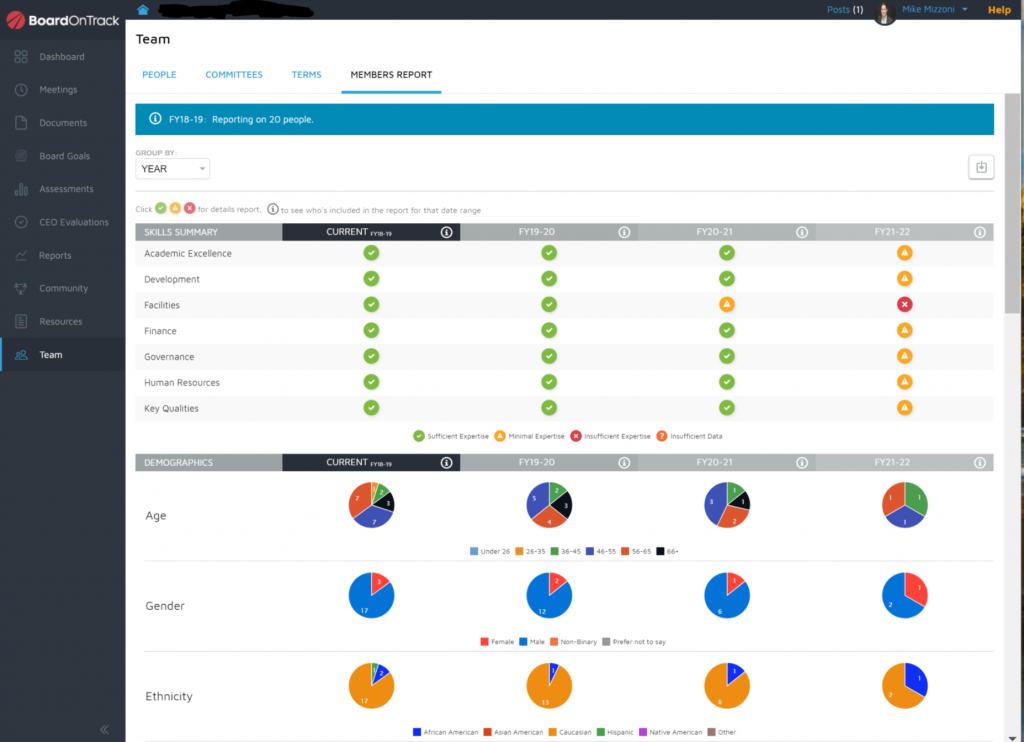
What Skills Are Needed on a Charter School Board?
As you recruit board members, whether for a founding board or as you scale, it’s vital to assess the needs of the organization.
The skills of the charter school board should complement the skills of the staff. The ideal board brings a depth of expertise that the staff of the school might never have.
There are a few key skills ever charter school board needs to have represented.
The most commonly needed skills for a charter school board are:
- Finance: accounting, banking, insurance, risk management
- Fundraising: face-to-face solicitation, networking
- Governance: previous board experience
- Human Resources: employee benefits, grievances, compensation, CEO annual reviews
- Public Relations: marketing, working with the media
- Facilities: real estate, facilities finances, construction management
What about legal expertise?
A lawyer can be a great addition to a board. However, a lawyer on your board should not serve as the school’s legal counsel. He or she can help you think about when it might make sense to get your legal counsel’s advice. The board should also retain independent legal counsel.
What about educational expertise?
Educators with high-level school management experience can contribute needed skills to the board — especially if they’ve run a school.
For example, retired independent school heads can make excellent trustees. They know what it is like to report to a board, often have great fundraising skills, and are well versed in governance and management issues.
Just keep in mind that, as with all things in governance, balance is key. Too many educators on a charter school board can make it difficult to keep the focus on governance.
When members are recruited to the board, make sure they agree to use a specific skill.
If you’re recruiting a potential board member because they have an outstanding track record as a fundraiser for the local hospital, make sure he or she is willing to use this skill for the benefit of your organization as well.
Sometimes, trustees are happy to use their professional skills on behalf of a board; sometimes, they’re looking to hone new skills. Make sure you’re explicit with them about why you’re recruiting them and what you expect of them.
Some redundancy can be a benefit.
Too often, boards look for only one person with a particular skill set and then move on to the next skill to fill. Boards can use more than one person with most of the skills listed above. Make sure you’re building bench strength to ensure you’ve got a solid succession plan.
Non-voting committee members can help round out your board’s skill sets.
We highly recommend having non-board members serve on your committees. It’s a great way to try people out; to add certain skills and expertise to the right committees. And it’s less of a commitment to ask somebody to serve on your committee than on your full board, so can be an excellent route to recruiting.
Note – the CEO Support & Evaluation Committee is the only exception to this recommendation. The nature of the work requires the leadership of full board members.
Keep track of which skills you’ve got on your board, and which you need to fill.
As your organization grows, your board will grow alongside it. And it’ll continue to be even more important to have the right people in the right roles, doing the right work.
You’ll need to keep a close eye on what skills you need today, and what skills your organization will need in its trustees in the future. This means knowing who’s on the board, whose terms will be coming to an end, how many new seats you’ll need to add along with new people you’ll need to recruit.
This can be a lot to manage. It’s why we built a three-year recruiting roadmap into the BoardOnTrack platform.
When each trustee completes their personal profile, the platform pulls all that data together for you and keeps it up to date. So you always have at-a-glance visibility into what skills are represented on your board today, and how that’ll change over the next three years.

Want to learn more about recruiting the right people at the right time? Download our eBook to dive into the responsibilities of the board and individual trustees to ensure you can recruit your best board.

Mike Mizzoni
With years in higher education, board governance, law, and state and local politics, Mike provides leadership and governance training to BoardOnTrack’s members.

